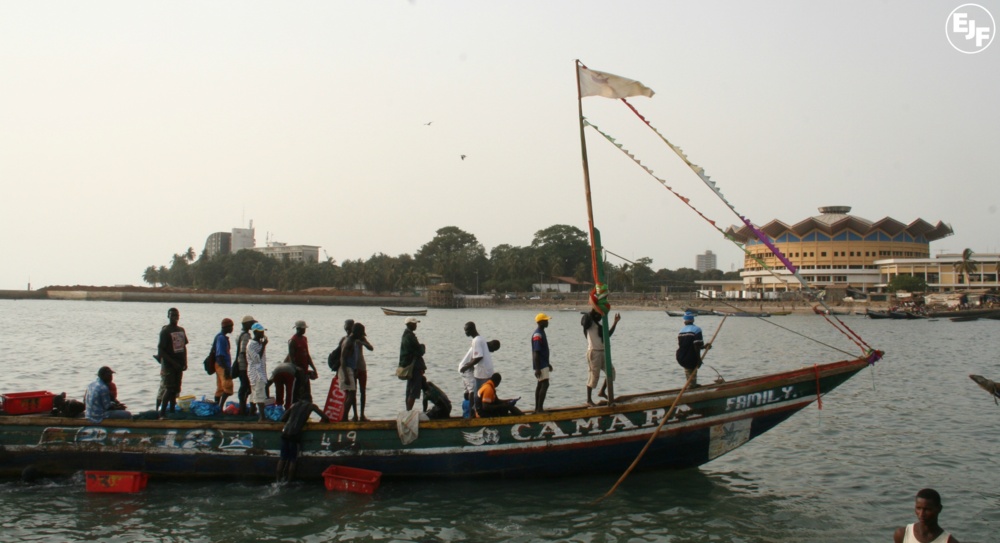
Combating pirate fishing in West Africa with the help of FIN
EJF believes that there must be greater equity in global fisheries to ensure developing countries and vulnerable communities are given fair access and support to sustainably manage their natural marine resources. Unfortunately, current attempts to sustainably manage fisheries are too often undermined by the growing threat posed by Illegal, Unreported and Unregulated (IUU) or ‘pirate’ fishing, which jeopardises the livelihoods and food security of some of the world’s poorest people. West Africa is often cited as being the hardest hit region of the world when it comes to the impacts of illegal fishing. Speaking to EJF in 2014, a Ghanaian fisherman described how pirate fishing is impacting local communities:
“They are catching fish that artisanal fishermen depend on. This is our livelihood, since we were born and we have nowhere to go.”
EJF is working to combat illegal pirate fishing in West Africa by promoting transparency and traceability in global seafood supply chains. EJF’s Fisheries Information Network (FIN) aims to ensure that transparency is improved, sanctions are imposed for IUU activities and trends are identified across the region to inform national, regional and global decision-making.
So what exactly does FIN do? The key, as the name suggests, is to make sure there is a network for information-sharing. A severe lack of monitoring, control and surveillance (MCS) currently exists in West African coastal States, with very few mechanisms in place to allow these States to share information and respond to enquiries relating to cases of suspected pirate fishing. FIN aims to support information-sharing amongst a number of key stakeholders, by developing a network of key contacts (community observers, port monitors, government whistleblowers) to gather and share intelligence on IUU vessels, as well as supporting States in monitoring their waters and enhancing information-sharing amongst these stakeholders.
FIN also supports the effective implementation of the EU IUU Regulation and international legal instruments such as the Port State Measures Agreement and FAO Voluntary Guidelines on Flag State Performance. This further promotes cooperation and the exchange of information between relevant States and international organisations.
Ultimately, enhancing the flow of information between stakeholders will ensure a far more transparent process of fisheries licensing and enforcement and lift the current veil of secrecy that surrounds industrial fishing vessels in West African coastal States, which has been known to increase opportunities for corruption and malpractice.
So far, more than 20 different States have been engaged in information-sharing thanks to FIN and the resulting increase in transparency should place a spotlight on IUU activities, bringing perpetrators out of the shadows and requiring immediate action to be taken.
At the same time, FIN is working on remote sensing technologies to provide coastal States with assistance to take their own steps in investigating cases of pirate fishing. EJF is working with Satellite AIS to support coastal States in monitoring their Exclusive Economic Zones (EEZ) and to help them be more aware of fishing activities in their waters through the creation of ‘Vessel Activities Notifications’.
The gathering of relevant information through FIN from desk-based research as well as from a network of community-based informants will lead to the issue of IUU alerts targeted at coastal, flag and port States, as well as Regional Fisheries Management Organisations (RFMOs), seafood companies and certification bodies. The IUU alerts provide recommendations to these stakeholders on what they can do to take further action on pirate fishing. These recommendations have frequently resulted in coastal States taking their own steps to investigate vessels, enforcing national laws on fisheries and strengthening cooperation at a regional level. With the help of FIN, over 35 investigations of vessels have already been carried out by coastal and flag States, resulting in the collection of fines in excess of US $1 million.
FIN is a valuable initiative that allows affected local communities to be involved in the fight against pirate fishing. We hope this will result in more sustainable and transparent global fisheries management regimes that emphasise not just economic gain, but more importantly, the local artisanal fishers and communities who rely on fisheries for food security and livelihoods.
SIGN UP FOR OUR EMAILS AND STAY UP TO DATE WITH EJF